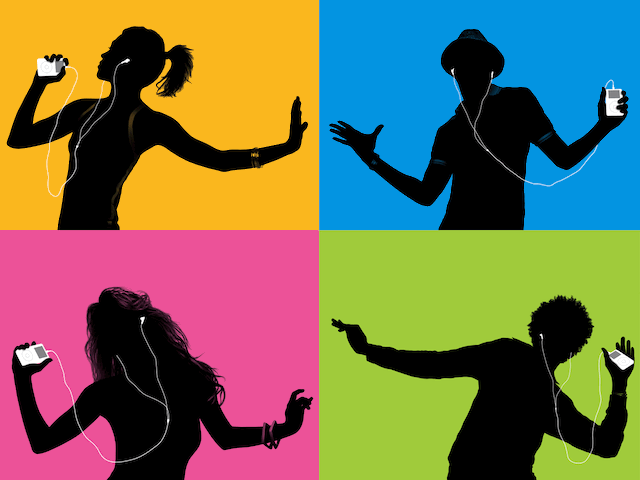My Very Favorite Possession
by Alexandra Molotkow

The iPod turned 14 this week, and while “World iPod Day” seems like a dubious holiday, I will say that the iPod Classic is by far my most valued possession: the penultimate stage of my cyborg fusion with the music I love which is, against what I could have imagined 15 years ago, completely totable.
I still can’t imagine living without a soundtrack. I grew up clinging to a yellow plastic walkman, black rubberized buttons for manual rewind, followed by a series of discmen and double-stuffed CD wallets as heavy as a sundials. Since I’ve been old enough to have my own music, I’ve had it to myself: it insulates me from worlds I don’t want to belong to, and forms my own like a separate sense.
I also grew up with albums. Loving music, as a kid, involved a lot of pining: sitting around the tape deck waiting for my song to come on the radio, dialling in requests and then redialling until the busy signal stopped (it never did). I saved up for tapes and CDs, and listened to them over and over again until they made sense to me. I loved every album I owned — each one was chosen carefully and if I hated it at first, I got to know it. The effort felt appropriate, my way of nesting.
I was 15 when the iPod was first introduced, and at first I hated the idea, which seemed profane, and threatening. Even burning CDs felt like cheating, and though I did cheat occasionally, an album didn’t feel like mine until I bought it — I burned Jorge Ben’s Força Bruta and África Brasil because it was a better option than life without them, but found his work eventually on import, at 30 bucks a pop. Collecting music was the lifestyle I’d opted into, my life’s primary source of longing and gratification, which strikes me as ridiculous until I think of all the longing and gratification folded into the albums I was hunting. I knew as soon as I submitted to MP3s, my most cherished possessions would lose their value.
I made the stubborn decision to start buying records — more objectively valuable, much less useful — but chasing down music I already owned made the albums seem more like abstractions, of which vinyl was only a symbol.
In 2007, or thereabouts, I bought a Zune off my roommate for 25 bucks. He’d gotten it free, as part of a promotion — did anyone anywhere buy a Zune? — and I thought it’d be convenient for the gym. Right away, I lost about 15 pounds of baggage, and got used to the ease of mobility. When I moved, upgrading from a PC desktop to a Mac laptop — as a kid I never thought I’d get to own a laptop, much less strip my life down to one — I gave in and bought a 160-gig iPod Classic, which remains the closest thing to an emotional holodeck.
My iPod is about five ounces, and it feels like home. Like my iPhone — on which I’ve documented most of my twenties, 4,486 photos and counting — the device feels like a tiny library of my memories. Photos are souvenirs, but songs are a means of reliving.
When I moved out of my last Toronto apartment, I stashed my records in my parents’ basement, along with several boxes of curled-up paper documents I can pull up in seconds on my MacBook Air. I do like the way they look — they’re evidence, at least, of a tangible effort, which is satisfying, but not particularly meaningful. My music goes where I do, and reminds me of everything; records remind me of bins.
My luggage was light, save a few dozen pounds of clothing, which I could live, grudgingly, without. So happy birthday to the iPod, which represents what I love most about being alive right now: getting to need so little.